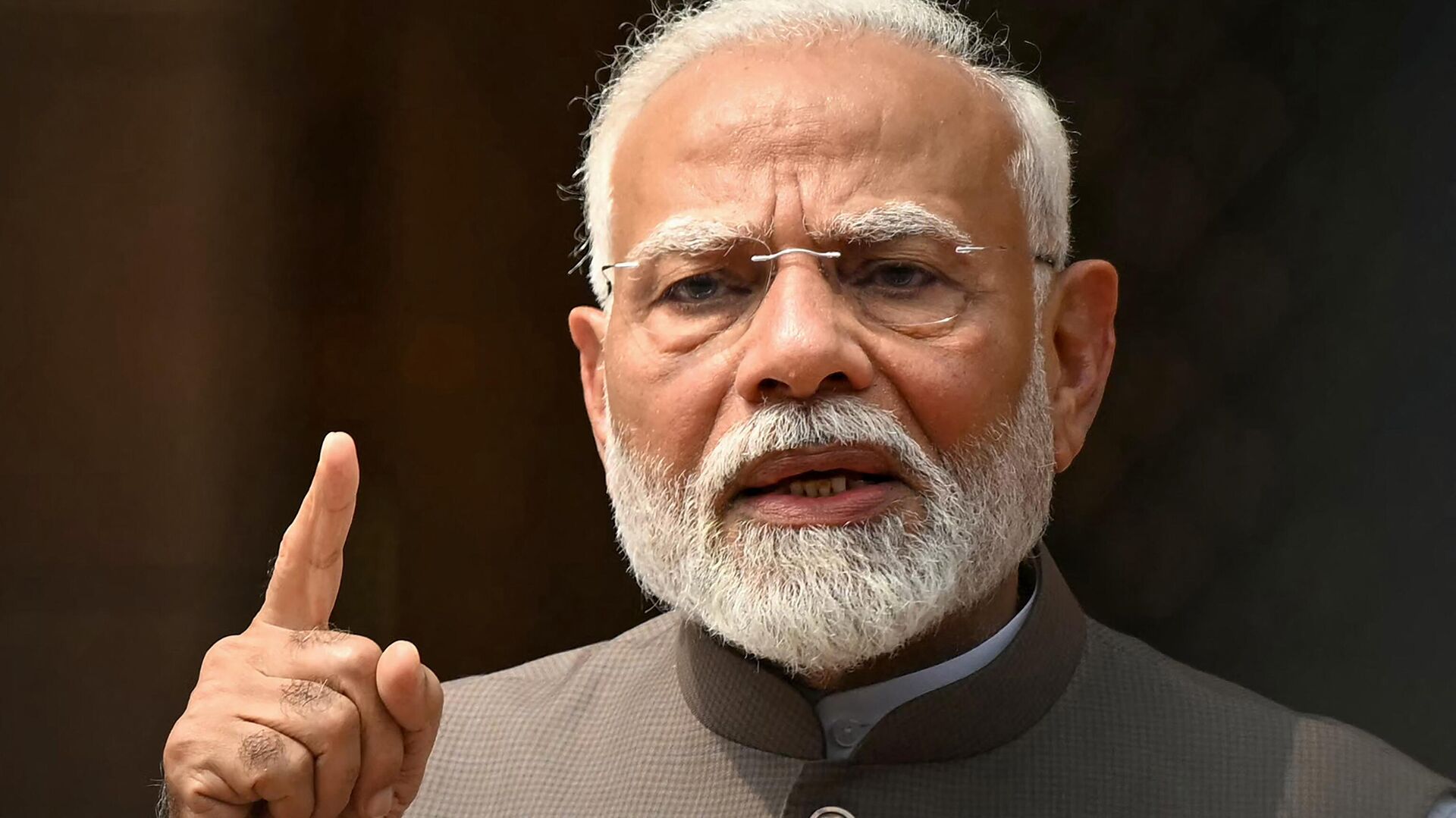India Conquering the Conquerors? That Book Almost Says So

© AFP 2023 SAJJAD HUSSAIN
Subscribe
The lady is plainly and openly saying that, and here is a direct quotation from her book: your country “has compelled the former conquerors to come to India with a hand outstretched”. That’s about the very nature of what currently transpires between Britain and India in general, being the essence of their relations.
The lady in question is Russian, her name is Lydia Kulik, she is a doctor of politology, a researcher in the Institute of Oriental Studies of the Russian Academy. The book is called "India and Britain In The Mirror Of Bilateral Relations", and I find that volume truly wonderful.
Everybody is discussing the strained and complicated set of relations between India and the US, or India and China. While the British angle remains incarcerated in these wonderful lairs of wisdom, the bookstores in Delhi. I love these walls of book covers, from the ceiling to the floor, telling me all about the Raj or the years soon after it. Mountbatten, Curzon, Lutyens, City of Jinns… Some of these books are here, in my study, while I write these lines.
And, funny, there are not too many books or articles on the current state and nature of relations between the former rulers and the ruled, says Lydia. Yes, we are friends with her, and that friendship dates back to the early 2000-s in Little India in Kuala Lumpur, of all the places.
No, there are not so many such books (or other publications) even in India. You may form an impression that, for India, the US or China are the present, while Britain is a thing of the past. But the moment you put yourself between these two magic mirrors and between the two nations viewing each other here and now, you discover a lot – not about the Raj, but about the nature of this very contemporary world, and also about the place India may take in that world.
Revelations in the book are numerous. Let me try to formulate my own impressions, while Lydia may agree or disagree. We are talking about a possibility of reverse colonialism. You could have laughed at such ideas a couple of years ago, but then Rishi Sunak took the reins in Great Britain, while Vivek Ramaswamy got himself close to vice-presidency of the US (and Kamala Harris candidacy suddenly sprang up). What, the better part of the English-speaking world being ruled by Indians? And leaders of Britain or America knowing quite well that they’ll have lots of problems without India as a friendly superpower?
A poet may chuckle at that, and write about justice. A researcher is a different kind of creature. Lydia Kulik, of course, is exploring meticulously the Indian diaspora in Britain (and the US), with figures and charts and analysis of exact influence of these people on economy and politics. But she also takes a good look at a phenomenon, rarely noticed by wider public. And that is the Commonwealth, which used to be regarded as a soft approach by the Brits to their former empire, with attempts to keep as much of that empire as possible.
But it looks like India is becoming, more and more, not exactly a dominant, but – shall we say – the central part of that Commonwealth structure, or at least that’s where the book is softly driving at. And, again, this trend shows us the possible shape of the world to come.
Lydia may be surprised at my sudden leap of logic, but the Commonwealth pages of her book have reminded me of an article I’ve recently encountered in the Foreign Affairs magazine. It was written by Mr. Happymon Jacob, a researcher from Delhi, and titled The End of South Asia. That article gives us a glimpse of strategic thinking of Indian elites, or, better say, of their focus of interest, which is very global and not what one may expect.
You thought the world shapes itself as a collection of regions, with one dominant economy and power at the center of each region, with India being the center of South Asia? But look at the basic idea of Mr. Jacob: The notion of belonging to South Asia has lost any of the traction it ever had. South Asians no longer look to one another for connection and solidarity but rather gaze farther afield, to the Middle East, Southeast Asia, or the West.
Why so? That’s because, Mr. Jacob is saying, ‘the Indian bureaucracy and strategic establishment (…) have long feared that the creation of regional structures could potentially check India’s dominance in its own backyard… India’s growing, prosperous middle class has little interest in South Asia, nor does it feel that it has much in common with people in neighboring countries. In the minds of this aspirational class of around 430 million people, many of whom have connections to diasporic communities in the West, the Middle East, and elsewhere in Asia, India is meant for bigger things than its immediate neighborhood’.
But that’s exactly what Lydia’s book is showing us, namely, that feeling that India is meant for bigger things. Or, to nail it like Happymon Jacob does, India ‘has embarked on a wider economic journey by signing and negotiating several important free-trade agreements with countries farther afield, such as Switzerland. New Delhi seeks a larger geopolitical space for itself. In contemporary Indian strategic thinking, South Asia is at best a small place and at worst a limitation’.
These ideas may be right or wrong, but there is something interesting about them, isn’t it?
Now is probably the time to say why I took so much interest in that thick book about India and Britain. My motivation has been, mostly, national pride. I love belonging to a nation with powerful tradition of Oriental studies. Russian Indology has always been strong, and strong it stays, and we, other Orientalists, plainly love it.
I’m talking about people I know and admire. That’s Tatiana Shaumian, something like a good fairy of today’s Indology, or Sergei Lunev, my co-ed in Moscow University. Or The Tempesta, an amazing lady called Irina Glushkova, with her love for Indian culture.
And don’t forget Professor Andrew Volodin who mentored me with this book, says Lydia. And then, there was Gratsia Kolykhalova, that wonderful lady who wrote a book called England and India way back in 1960-s, and you cannot find that book anywhere today. But its very existence, as well as the fact that almost no one picked up the subject ever since, drove me to that book of mine, says she.
And then she points her finger at the bibliography pages of that book of today, with names, dozens of names of Russian Indologists to quote from.
So my conclusion here is simple. We don’t know if India will rule the English-speaking world, or will just take its very prominent place in that or other parts of the world in whole. But, speaking about Russia, I’m not seriously worried about its future, as long as there is enough people here who help the nation understand, among many other things, what India is and may become.
Dmitry Kosyrev is a Russian writer, author of spy novels and short stories. He also did columns for the Pioneer and Firstpost.com

